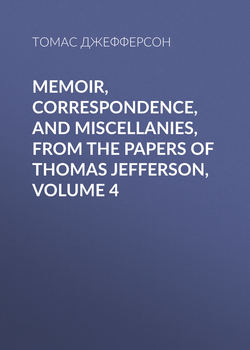Читать книгу Memoir, Correspondence, And Miscellanies, From The Papers Of Thomas Jefferson, Volume 4 - Томас Джефферсон, Thomas Jefferson - Страница 59
LETTER LIX.—TO WILLIAM DUANE, July 20, 1807
ОглавлениеTO WILLIAM DUANE.
Washington, July 20, 1807.
Sir,
Although I cannot always acknowledge the receipt of communications, yet I merit their continuance by making all the use of them of which they are susceptible. Some of your suggestions had occurred, and others will be considered. The time is coming when our friends must enable us to hear every thing, and expect us to say nothing; when we shall need all their confidence that every thing is doing which can be done, and when our greatest praise shall be, that we appear to be doing nothing. The law for detaching one hundred thousand militia, and the appropriation for it, and that for fortifications, enable us to do every thing for land service, as well as if Congress were here; and as to naval matters, their opinion is known. The course we have pursued, has gained for our merchants a precious interval to call in their property and our seamen, and the postponing the summons of Congress will aid in avoiding to give too quick an alarm to the adversary. They will be called, however, in good time. Although we demand of England what is merely of right, reparation for the past, security for the future, yet as their pride will possibly, nay probably, prevent their yielding them to the extent we shall require, my opinion is, that the public mind, which I believe is made up for war, should maintain itself at that point. They have often enough, God knows, given us cause of war before; but it has been on points which would not have united the nation. But now they have touched a chord which vibrates in every heart. Now then is the time to settle the old and the new.
I have often wished for an occasion of saying a word to you on the subject of the Emperor of Russia, of whose character and value to us, I suspect you are not apprized correctly. A more virtuous man, I believe, does not exist, nor one who is more enthusiastically devoted to better the condition of mankind. He will probably, one day, fall a victim to it, as a monarch of that principle does not suit a Russian noblesse. He is not of the very first order of understanding, but he is of a high one. He has taken a peculiar affection to this country and its government, of which he has given me public as well as personal proofs. Our nation being like his, habitually neutral, our interests as to neutral rights, and our sentiments, agree. And whenever conferences for peace shall take place, we are assured of a friend in him. In fact, although in questions of restitution he will be with England, in those of neutral rights he will be with Bonaparte and every other power in the world, except England: and I do presume that England will never have peace until she subscribes to a just code of marine law. I have gone into this subject, because I am confident that Russia (while her present monarch lives) is the most cordially friendly to us of any power on earth, will go furthest to serve us, and is most worthy of conciliation. And although the source of this information must be a matter of confidence with you, yet it is desirable that the sentiments should become those of the nation. I salute you with esteem and respect.
Th: Jefferson.
